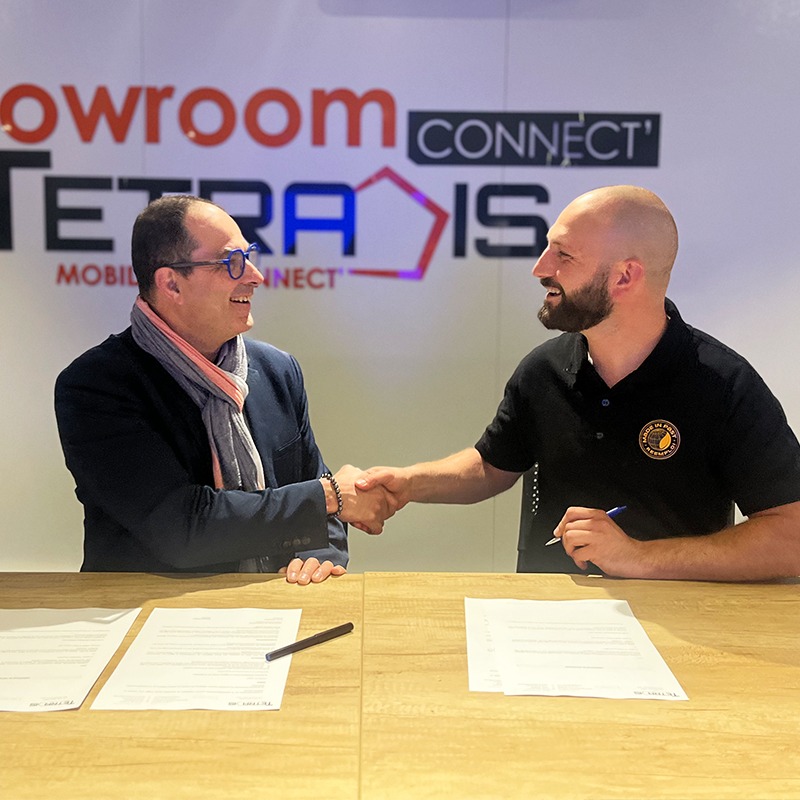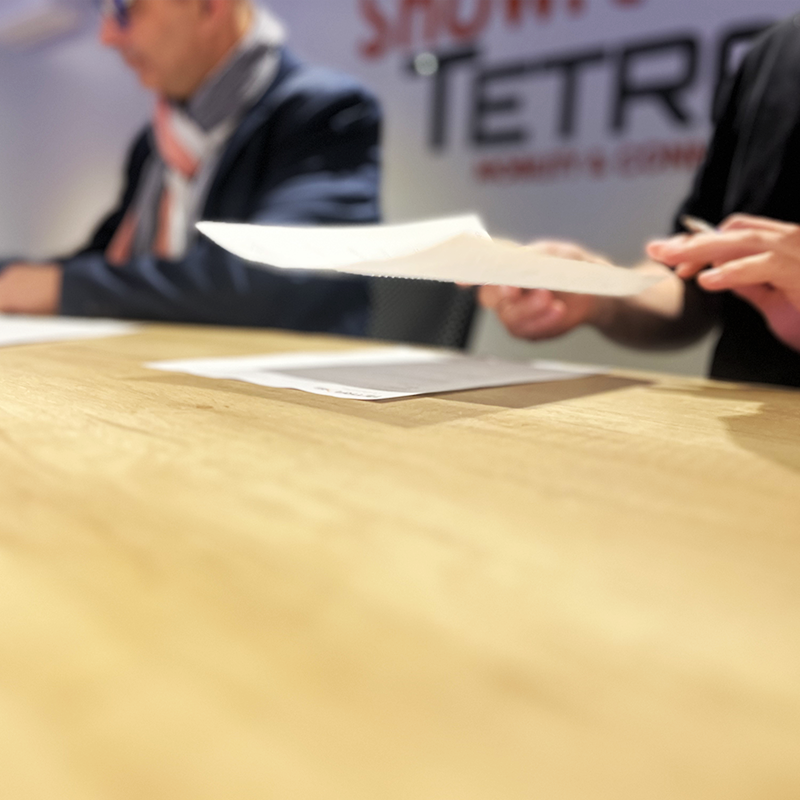Made In Past & TETRADIS, a partnership to develop re-use
Corporate
Posted on 10.07.2023
A few weeks ago, Made In Past came to meet us to find out more about our electrical equipment reconditioning process.
Maxime CORNUT, co-manager of Made In Past, is delighted with the approach we have adopted, and has signed a partnership agreement with TETRADIS. The aim is to work together on the theme of reuse, to move from a linear to a circular model. Maxime describes reuse as a growing practice, echoed in many circles, particularly in the construction industry. Gradually, reuse is becoming an integral part of each of our businesses, to meet the challenges of the years to come. Read his full testimonial. Made In Past is dedicated to re-use.
• Can you tell us more about your philosophy?
Maxime C.: Change, innovation, iteration.
Made In Past was founded on the observation that the approach to waste in the building industry needed to evolve. The existing paradigm no longer corresponded to current environmental challenges and market expectations. However, any change in practice involves disrupting existing balances and changing the value chain. These two implications can legitimately hinder the growth of reuse.At Made In Past, our philosophy is therefore to propose a new model for the waste economy that takes into account all the constraints of the current model. To achieve this, we focus our work on implementing innovative solutions in the field, which we adapt and develop according to our feedback and our customers' expectations. The aim is not to displace existing value, but to create new value!
• Do you observe a change in consumer habits?
Maxime C.: Since 2018, the year Made In Past was founded, practices have changed a lot. We're finding more and more support from all those involved in the building industry: project owners, architects, project managers, construction companies - everyone is starting to integrate reuse into their work.This is inevitably due to changing regulations, but above all we can see that our contacts are increasingly convinced, on a personal level, of the circular logic implicit in reuse.
• What are the main challenges facing the development of reuse?
Maxime C.: Reconditioning and massificationAs explained above, we believe that there can be no practical change if it's disconnected from the current model.In this case, as far as the supply of materials is concerned, available stocks must be sufficient to satisfy a market waiting for large volumes. Furthermore, it is impossible to put back on the market products that do not meet expected standards. Without going into the details of warranty and insurance obligations, it is essential that all reused materials offered for sale go through a reconditioning stage. The challenge, then, is to bring sufficient volumes of materials onto the market to the same standard as new ones.
• Why did you partner with TETRADIS?
Maxime C.: We share a similar vision with Tetradis, which is what initially brought us together. But beyond that, TETRADIS possesses technical know-how that is essential to the remarketing of certain flows of electrical equipment, and to our aim of massification. We therefore decided to conduct experiments together, and it's working!This enables us to offer reusable products for which we can guarantee not only removal and storage conditions, but also operation.
• How do you see TETRADIS' investment in reuse, given that this is not its core business?
Maxime C.: We see this investment as far-sighted, of course, but above all as proof of an innovative and eco-responsible vision.It reflects Tetradis' determination to see its business evolve by applying the experience it has acquired over the last 20 years.
• How important is this type of partnership for Made In Past?
Maxime C.: Apart from the fact that Made In Past is very happy with this partnership, it also demonstrates, in a general way, that it is possible to build bridges between reuse players and industrial suppliers.Up until now, we've been operating on a linear model: the manufacturer supplied a product, which was then used in a building, only to be thrown away when it was deconstructed.Today, we have the capacity to present a circular model, since the same deconstructed product finds a place again with the manufacturer, enabling it to be put back on the market. It's a proof of concept.
If you're interested in this circular approach, please contact us!
➡️ Find out more about our range of re-use rack on the TETRADIS website.
Maxime CORNUT, co-manager of Made In Past, is delighted with the approach we have adopted, and has signed a partnership agreement with TETRADIS. The aim is to work together on the theme of reuse, to move from a linear to a circular model. Maxime describes reuse as a growing practice, echoed in many circles, particularly in the construction industry. Gradually, reuse is becoming an integral part of each of our businesses, to meet the challenges of the years to come. Read his full testimonial. Made In Past is dedicated to re-use.
• Can you tell us more about your philosophy?
Maxime C.: Change, innovation, iteration.
Made In Past was founded on the observation that the approach to waste in the building industry needed to evolve. The existing paradigm no longer corresponded to current environmental challenges and market expectations. However, any change in practice involves disrupting existing balances and changing the value chain. These two implications can legitimately hinder the growth of reuse.At Made In Past, our philosophy is therefore to propose a new model for the waste economy that takes into account all the constraints of the current model. To achieve this, we focus our work on implementing innovative solutions in the field, which we adapt and develop according to our feedback and our customers' expectations. The aim is not to displace existing value, but to create new value!
• Do you observe a change in consumer habits?
Maxime C.: Since 2018, the year Made In Past was founded, practices have changed a lot. We're finding more and more support from all those involved in the building industry: project owners, architects, project managers, construction companies - everyone is starting to integrate reuse into their work.This is inevitably due to changing regulations, but above all we can see that our contacts are increasingly convinced, on a personal level, of the circular logic implicit in reuse.
• What are the main challenges facing the development of reuse?
Maxime C.: Reconditioning and massificationAs explained above, we believe that there can be no practical change if it's disconnected from the current model.In this case, as far as the supply of materials is concerned, available stocks must be sufficient to satisfy a market waiting for large volumes. Furthermore, it is impossible to put back on the market products that do not meet expected standards. Without going into the details of warranty and insurance obligations, it is essential that all reused materials offered for sale go through a reconditioning stage. The challenge, then, is to bring sufficient volumes of materials onto the market to the same standard as new ones.
• Why did you partner with TETRADIS?
Maxime C.: We share a similar vision with Tetradis, which is what initially brought us together. But beyond that, TETRADIS possesses technical know-how that is essential to the remarketing of certain flows of electrical equipment, and to our aim of massification. We therefore decided to conduct experiments together, and it's working!This enables us to offer reusable products for which we can guarantee not only removal and storage conditions, but also operation.
• How do you see TETRADIS' investment in reuse, given that this is not its core business?
Maxime C.: We see this investment as far-sighted, of course, but above all as proof of an innovative and eco-responsible vision.It reflects Tetradis' determination to see its business evolve by applying the experience it has acquired over the last 20 years.
• How important is this type of partnership for Made In Past?
Maxime C.: Apart from the fact that Made In Past is very happy with this partnership, it also demonstrates, in a general way, that it is possible to build bridges between reuse players and industrial suppliers.Up until now, we've been operating on a linear model: the manufacturer supplied a product, which was then used in a building, only to be thrown away when it was deconstructed.Today, we have the capacity to present a circular model, since the same deconstructed product finds a place again with the manufacturer, enabling it to be put back on the market. It's a proof of concept.
If you're interested in this circular approach, please contact us!
➡️ Find out more about our range of re-use rack on the TETRADIS website.

